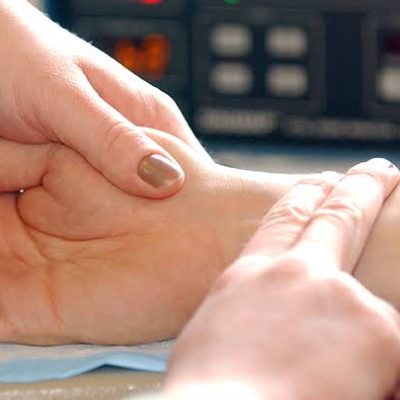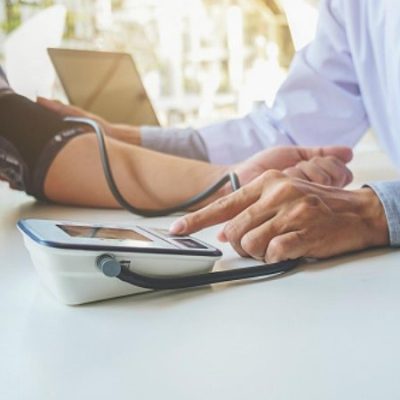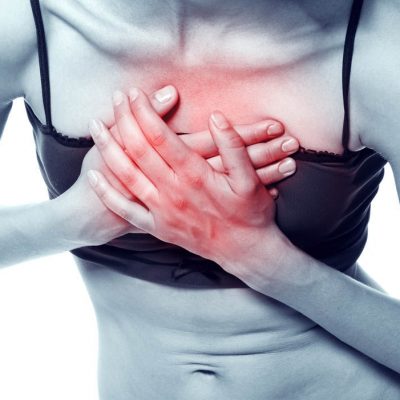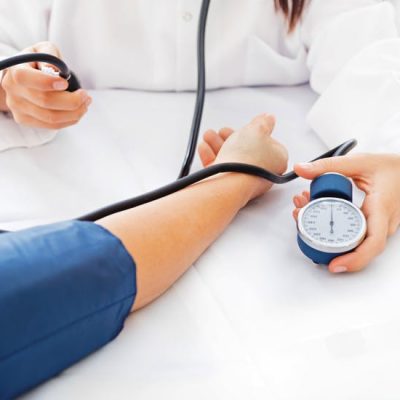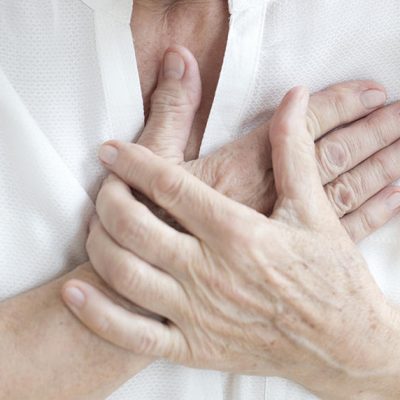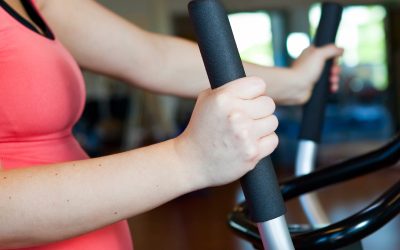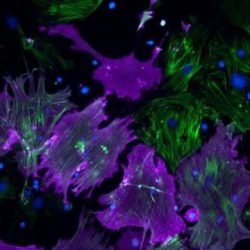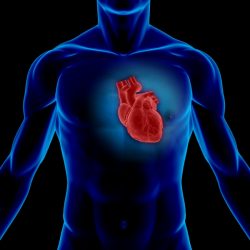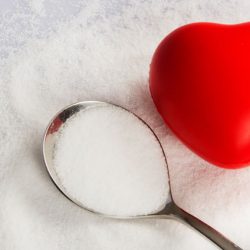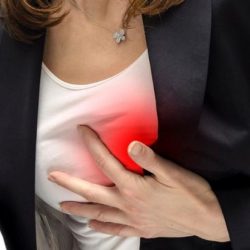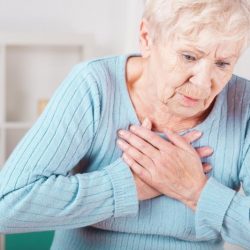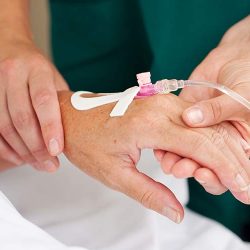Researchers may have discovered a way to turn back the clock on aging heart muscles in fruit flies, a development that could lead to new therapies for older humans with heart disease. Hua Bai, an assistant professor of genetics, development and cell biology at Iowa State University, led a study, published recently in the academic journal Autophagy, that explores the … [Read more...]
Cardiovascular Health

Possible therapeutic target for slow healing of aged muscles
An age-related decline in recovery from muscle injury can be traced to a protein that suppresses the special ability of muscle stem cells to build new muscles, according to work from a team of current and former Carnegie biologists led by Chen-Ming Fan and published in Nature Metabolism. Skeletal muscles have a tremendous capacity to make new muscles from special muscle stem … [Read more...]
Why intense light can protect cardiovascular health
Researchers at the University of Colorado Anschutz Medical Campus have found that intense light amplifies a specific gene that bolsters blood vessels and offers protection against heart attacks. "We already knew that intense light can protect against heart attacks, but now we have found the mechanism behind it," said the study's senior author Tobias Eckle, MD, PhD, … [Read more...]
Vast majority of dietary supplements don’t improve heart health or put off death, study finds
In a massive new analysis of findings from 277 clinical trials using 24 different interventions, Johns Hopkins Medicine researchers say they have found that almost all vitamin, mineral and other nutrient supplements or diets cannot be linked to longer life or protection from heart disease. Although they found that most of the supplements or diets were not associated with … [Read more...]
Trips to the Toilet at Night are A Sign of High Blood Pressure Check Your Blood Pressure and Salt Intake
Trips to the toilet at night are a sign of high blood pressure, according to results from the Watari study presented today at the 83rd Annual Scientific Meeting of the Japanese Circulation Society (JCS 2019). "Our study indicates that if you need to urinate in the night -- called nocturia -- you may have elevated blood pressure and/or excess fluid in your body," said study … [Read more...]
Vitamin D levels in the blood linked to cardiorespiratory fitness
Vitamin D levels in the blood are linked to cardiorespiratory fitness, according to a study published today in the European Journal of Preventive Cardiology, a publication of the European Society of Cardiology (ESC). "Our study shows that higher levels of vitamin D are associated with better exercise capacity," said Dr Amr Marawan, assistant professor of internal … [Read more...]
Heart attack: Substitute muscle thanks to stem cells
Myocardial infarction -- commonly known as a heart attack -- is still one of the main causes of death. According to the Federal Statistical Office, more than 49,00 people died of its consequences. And yet the mortality after heart attack has greatly decreased over the past decades: As compared to the early 1990s, it has more than halved until 2015, according to the German … [Read more...]
Dementia can be caused by hypertension
A new study in Cardiovascular Research, published by Oxford University Press, indicates that patients with high blood pressure are at a higher risk of developing dementia. This research also shows (for the first time) that an MRI can be used to detect very early signatures of neurological damage in people with high blood pressure, before any symptoms of dementia occur. High … [Read more...]
Mediterranean-style eating with lean, unprocessed red meat improves heart disease risk
Adopting a Mediterranean-style eating pattern improves heart health, with or without reducing red meat intake, if the red meat consumed is lean and unprocessed, according to a Purdue University nutrition study. "This study is important because it shows that red meat can be part of a heart-healthy eating pattern like a Mediterranean-style eating pattern," said Wayne W. … [Read more...]
Hot flashes can last longer than you think
Menopause symptoms are not just for midlife anymore, according to a new Mayo Clinic study published this month in the Journal of the North American Menopause Society. The study, conducted by researchers at Mayo Clinic gathered data from nearly 5,000 women. When asked whether they experienced any symptoms commonly associated with menopause, such as hot flashes and night … [Read more...]
When heart disease runs in the family, exercise may be best defense
Data assessed from roughly a half-million people in the UK Biobank database showed that greater grip strength, more physical activity and better cardiorespiratory fitness are all associated with reduced risk for heart attacks and stroke, even among people with a genetic predisposition for heart disease. For participants with an intermediate genetic risk for cardiovascular … [Read more...]
Women most at risk for heart failure weeks after giving birth
A study from the University of Illinois at Chicago has found that women are at the highest risk for heart failure within the six weeks after delivery, known as the postpartum period. "This finding lends support to using delivery-related hospitalization as a window of opportunity to identify high-risk women and develop surveillance strategies before discharge," said the … [Read more...]
New insights into why patients have a higher risk of heart attack in the morning
Cardiovascular disease patients have lower levels of an important family of protective molecules in their blood in the morning, which could be increasing their risk of blood clots and heart attacks at those times, according to early research led by Queen Mary University of London. The discovery of the importance of this compound in the blood could lead to new ways to … [Read more...]
Exercise may decrease heart drug’s effectiveness
Peter Ruben and his team of researchers have spent years studying why seemingly healthy patients with inherited cardiac arrhythmias can sometimes suddenly die during exercise. (2017, 2016, 2015) His past research has shown that exercising can trigger a perfect storm of events, unmasking an arrhythmia: high heart rate, elevated body temperature, and elevated acid in the … [Read more...]
What is a ‘normal’ blood pressure response during exercise testing?
New data from the University of Illinois at Chicago suggest that the guidelines used to evaluate an individual's peak blood pressure response during cardiopulmonary exercise testing, which were last updated in 1996 and help doctors screen for hypertension and cardiovascular disease, may need to be revised. "This is the first systemic effort to establish maximum … [Read more...]
Obesity, other risks play large role in sudden cardiac arrest among the young
Obesity and other common cardiovascular risk factors may play a greater role in sudden cardiac arrest among younger people than previously recognized, underscoring the importance of earlier screening, a Cedars-Sinai study has found. While sports activity often garners attention in cases of sudden cardiac arrest in younger patients, it was cited only in a small … [Read more...]
Eating yogurt may reduce cardiovascular disease risk
A new study in the American Journal of Hypertension, published by Oxford University Press, suggests that higher yogurt intake is associated with lower cardiovascular disease risk among hypertensive men and women. High blood pressure is a major cardiovascular disease risk factor. Clinical trials have previously demonstrated beneficial effects of dairy consumption on … [Read more...]
Exercise is good for the heart, high blood pressure is bad: Researchers find out why
When the heart is put under stress during exercise, it is considered healthy. Yet stress due to high blood pressure is bad for the heart. Why? And is this always the case? Researchers of the German Centre for Cardiovascular Research (DZHK) and of Heidelberg University Hospital have obtained new findings which indicate that a previously undetected signal pathway causes or … [Read more...]
How to turn damaged heart tissue back into healthy heart muscle: New details emerge
Reversing scar tissue after a heart attack to create healthy heart muscle: this would be a game-changer in the field of cardiology and regenerative medicine. In the lab, scientists have shown it's possible to change fibroblasts (scar tissue cells) into cardiomyocytes (heart muscle cells), but sorting out the details of how this happens hasn't been easy, and using this kind of … [Read more...]
Low serum calcium may increase risk of sudden cardiac arrest
Sudden cardiac arrest (SCA) is fatal for over 90% of patients, and more than half of men and close to 70% of women who die of SCA have no clinical history of heart disease prior to this cardiac event. It is one of the leading causes of death in the United States and kills more people than any single cancer. Many patients who suffer SCA would not be considered high risk under … [Read more...]
Breast implants may impede ECG and lead to false heart attack diagnosis
Breast implants may impede an electrocardiogram (ECG) and could result in a false heart attack diagnosis, according to research presented at EHRA EUROPACE -- CARDIOSTIM 2017. "Our experience shows that breast implants make it difficult to see the heart with echocardiography because ultrasound cannot penetrate through the implant," said lead author Dr Sok-Sithikun Bun, a … [Read more...]
Vital role for mitochondrial calcium exchange in heart function
Scientists have long thought that calcium transport into mitochondria -- the powerhouses of cells -- is a key signal linking cardiac workload, or how hard the heart pumps, with energy production. Studies at the Lewis Katz School of Medicine at Temple University (LKSOM) and elsewhere have shown the importance of this pathway during stress, but they have also questioned the dogma … [Read more...]
Low-sodium diet might not lower blood pressure
A new study found that consuming less sodium wasn't associated with lower blood pressure. The new findings call into question the sodium limits recommended by the current Dietary Guidelines for Americans. Lynn L. Moore, DSc, associate professor of medicine at Boston University School of Medicine, will present the new research at the American Society for Nutrition … [Read more...]
Silent heart attack in women
Many women put too much pressure on themselves to make the holidays perfect for everyone. This can add a lot of unnecessary stress and anxiety that can lead to serious heart problems. Houston Methodist DeBakey Heart & Vascular Center cardiologist Karla Kurrelmeyer, M.D. says in their quest to get everything done on time, some women will ignore the mild symptoms of a … [Read more...]
Women have problems sticking to cardiac rehab programs
Cardiovascular disease is a leading cause of disability globally. Participation in cardiac rehabilitation programs is associated with significantly lower death, but evidence suggests that women are significantly less likely to stick to a cardiac rehabilitation program than men, according to investigators writing in the Canadian Journal of Cardiology. Cardiac … [Read more...]
Argentina with cigarettes “cheapest in the world” lead to rise in heart attack patients
Levels of smoking are rising in heart attack patients in Argentina, according to a study presented at the Argentine Congress of Cardiology (SAC 2016). The findings coincide with a 100% increase in affordability in the last decade, which have made cigarettes among the cheapest in the world. Researchers also report improved treatment for heart attacks but no decrease in … [Read more...]
Moderate alcohol intake may slow good cholesterol’s decline
In a study of 80,000 healthy Chinese adults, moderate drinking was associated with slower declines in high-density lipoprotein (HDL), or good cholesterol, over time, according to a preliminary study presented at the American Heart Association's Scientific Sessions 2016. Researchers followed alcohol consumption and HDL levels for more than six years in this … [Read more...]
High Protein Diet Linked To Heart Failure In Older Women
Women over the age of 50 who follow a high-protein diet could be at higher risk for heart failure, especially if much of their protein comes from meat, according to preliminary research presented at the American Heart Association's Scientific Sessions 2016. Researchers evaluated the self-reported daily diets of 103,878 women between the ages of 50 and 79 years, from 1993 … [Read more...]
Cardiovascular risk factor prevention should be addressed at all ages
Prevention of cardiovascular disease in mid- to later life in black and white Americans is an increasingly important health concern, according to a study from the Reasons for Geographic and Racial Differences in Stroke project recently published in the Journal of the American Geriatrics Society. University of Alabama at Birmingham investigators and their colleagues found … [Read more...]
A Cardioprotective Chemotherapy Drug Can Have Negative Effects On Heart
A potent chemotherapy drug can be life saving for children with cancer, but a new review highlights how it can have long-lasting negative effects on the heart. The review, which is published in the British Journal of Clinical Pharmacology, also indicates that this chemotherapy-related heart damage may be prevented by a cardioprotective drug. Advances in cancer therapy have … [Read more...]
- « Previous Page
- 1
- 2
- 3
- 4
- 5
- …
- 35
- Next Page »
